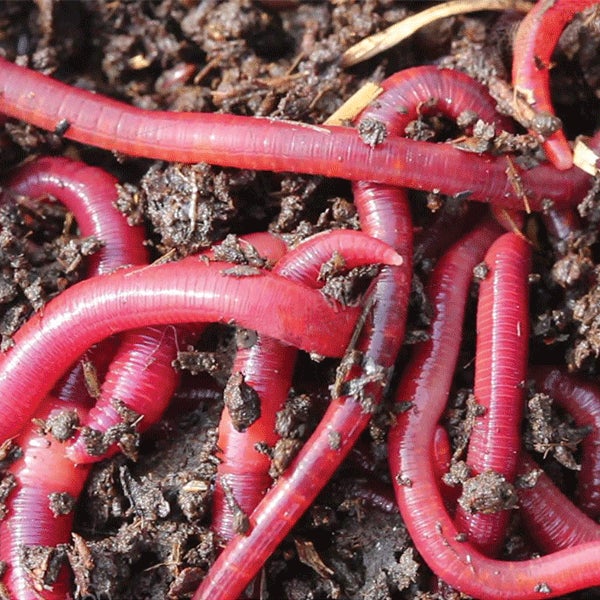Why Red Wigglers Are Important for Chemical-free Farming
Red wigglers play an essential function in natural farming, largely with their one-of-a-kind capacity to disintegrate organic materials and improve dirt health and wellness. The degree of their impact on agricultural practices and dirt biology elevates appealing questions regarding the future of natural farming.
Function of Red Wigglers in Dirt Wellness

Additionally, red wigglers improve soil structure by producing channels as they tunnel. These channels boost oygenation and water seepage, promoting a much healthier root setting. Their activity also aids in maintaining ideal dampness degrees, which is important for healthy plant development.

Benefits of Worm Castings
Worm spreadings, the nutrient-rich excrement generated by red wigglers, offer as an effective modification for natural farming. These spreadings are teeming with necessary nutrients such as nitrogen, phosphorus, and potassium, which are important for plant growth. Unlike synthetic plant foods, worm spreadings release nutrients slowly, providing a stable supply over time and reducing the threat of nutrient leaching and overflow.
Furthermore, worm spreadings improve dirt structure and oygenation, promoting healthier origin systems. Their high raw material content enhances moisture retention, enabling plants to much better hold up against drought conditions. Additionally, worm spreadings contain useful microbes that sustain plant health and wellness by reducing virus and improving nutrition uptake.
The application of worm spreadings can bring about increased plant returns and improved quality of fruit and vegetables, making them an important source for organic farmers. Their use additionally lines up with lasting farming methods, contributing to dirt fertility without the negative ecological effects associated with chemical plant foods. Overall, the incorporation published here of worm spreadings into agricultural practices fosters a more resistant and productive ecosystem, highlighting the relevance of red wigglers in chemical-free farming systems.

Enhancing Nutrient Cycling
(red wiggler worms near me)Nutrient cycling is a crucial procedure in natural farming, and the integration of red wigglers plays a critical function in improving this cycle. These earthworms contribute substantially to the malfunction of raw material, assisting in the improvement of intricate natural products into simpler, extra available nutrients for plants. As red wigglers eat decomposing natural matter, they eliminate nutrient-rich spreadings, which are brimming with valuable microbes. This microbial task more help in the decay process, ensuring that important nutrients are conveniently available for plant uptake.
Additionally, red wigglers assist to accelerate the mineralization of nutrients, transforming them from inert types right into bioavailable forms that plants can take in. This process is important for keeping soil fertility and advertising healthy and balanced plant growth. The existence of red wigglers also encourages a diverse soil ecological community, fostering a balance of nutrients that sustains various plant varieties.
Improving Soil Framework
The improvement of soil structure is vital for promoting a healthy and balanced farming ecosystem, and the task of red wigglers dramatically adds to this enhancement. These earthworms play an essential duty in aerating the soil and developing a network of channels that assist in water seepage and origin infiltration. As they tunnel through the dirt, red wigglers damage up compressed layers, enabling much better oxygen exchange and promoting microbial task.
Furthermore, the organic matter produced from their waste, referred to as vermicast, enhances soil aggregation. This process creates secure globs of soil fragments, improving dirt porosity and minimizing erosion (red wigglers). The presence of red wigglers also motivates the development of useful fungal networks, which are essential for nutrient uptake by plants
Supporting Lasting Practices
Incorporating red wigglers right into organic farming practices not just improves soil wellness but also advertises sustainable agricultural techniques. These earthworms play a crucial function in nutrition biking, transforming natural waste into valuable compost that improves the dirt. By using red wigglers, farmers can successfully reduce reliance on artificial plant foods, consequently lessening chemical drainage and its detrimental effects on ecosystems.
In addition, the incorporation of red wigglers motivates the method of reusing organic materials, such as cooking area scraps and ranch waste. This waste decrease approach not just reduces disposal costs however also cultivates a closed-loop system where nutrients are continuously gone back to the soil (red wigglers). Such practices are crucial in minimizing climate change, as they enhance carbon sequestration and reduce greenhouse gas exhausts
In addition, red wigglers enhance water retention in the dirt, which is vital in times of drought. Their burrowing activities develop channels that permit water to pass through much deeper right into the ground, therefore advertising efficient water usage. Eventually, incorporating red wigglers right into natural farming not only sustains biodiversity but additionally lines up with the principles of sustainable farming, offering a holistic approach to food manufacturing.
Final Thought
In final thought, red wigglers play an essential role in organic farming by substantially boosting soil wellness and fertility. Therefore, the assimilation of red wigglers right into farming techniques is crucial for advertising sustainability and improving general soil quality.